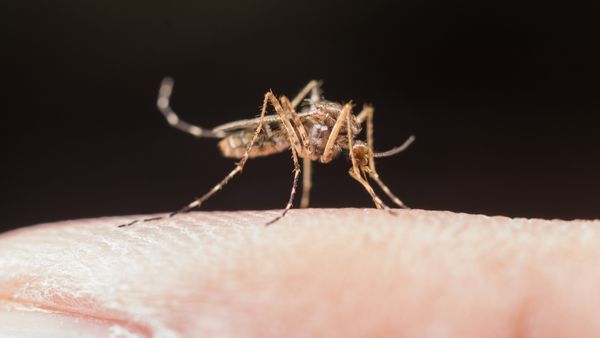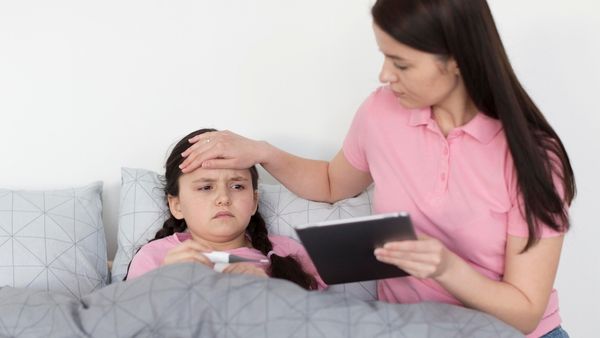Just In
- 36 min ago

- 50 min ago

- 4 hrs ago

- 11 hrs ago

Don't Miss
- Movies
 Chief Detective 1958 Episode 2 OTT Release Date, Time, Platform: When & Where To Watch? What To Expect? DEETS
Chief Detective 1958 Episode 2 OTT Release Date, Time, Platform: When & Where To Watch? What To Expect? DEETS - Sports
 IPL 2024: LSG vs CSK Award Winners, Man of The Match, Post-Match Presentation, Scorecard & Records
IPL 2024: LSG vs CSK Award Winners, Man of The Match, Post-Match Presentation, Scorecard & Records - News
 Chinese President Xi Jinping Orders Biggest Military Reorganisation Since 2015
Chinese President Xi Jinping Orders Biggest Military Reorganisation Since 2015 - Education
 Exam Pressure Does Not Exist; Studying Punctually is Crucial; Says Aditi, the PSEB 2024 Topper
Exam Pressure Does Not Exist; Studying Punctually is Crucial; Says Aditi, the PSEB 2024 Topper - Finance
 Reliance, ONGC, Tata, Adanis: Energy Stocks Didn't Get The Memo Of Bears, Up 12% In 30-Days; 10 Stocks To BUY
Reliance, ONGC, Tata, Adanis: Energy Stocks Didn't Get The Memo Of Bears, Up 12% In 30-Days; 10 Stocks To BUY - Automobiles
 Suzuki Swift Hatchback Scores 4 Star Safety Rating At JNCAP – ADAS, New Engine & More
Suzuki Swift Hatchback Scores 4 Star Safety Rating At JNCAP – ADAS, New Engine & More - Technology
 Dell Introduces AI-Powered Laptops and Mobile Workstations for Enterprises in India
Dell Introduces AI-Powered Laptops and Mobile Workstations for Enterprises in India - Travel
 Journey From Delhi To Ooty: Top Transport Options And Attractions
Journey From Delhi To Ooty: Top Transport Options And Attractions
Dengue In Children: 8 Serious Symptoms Parents Should Know
Dengue is a mosquito-borne disease caused by the dengue virus (DENV) and spread by the Aedes mosquitoes. According to The Centers for Disease Control and Prevention (CDC), around 400 million people are infected with dengue every year globally.
When a person is bitten by the mosquito carrying the virus, it usually takes 4-6 days for the symptoms to appear. High fever, persistent headaches, pain behind the eyes and muscle and joint pain are the usual symptoms.
Several states in India have reported an increase in dengue cases. With the onset of the monsoons, vector-borne diseases such as dengue, malaria, and chikungunya tend to increase in the June-July period. As a result, cases have recently increased, especially in West Bengal, Bhopal, Uttar Pradesh, and in cities such as Delhi and Bangalore [1].

Dengue In Children: What Parents Should Know
Dengue is characterised by a sudden onset of fever, severe headache, muscle and joint pain (so-called "break-bone fever"), and a rash over the body. The patient may also experience abdominal pain, nausea, vomiting, or diarrhoea due to gastritis [2].
The symptoms of dengue in children differ slightly from those in adults. Kids can suffer from mild and severe dengue symptoms depending on whether this is their first time getting the disease. For example, children with dengue fever usually present mild symptoms, but older children and adults with earlier infections may present moderate to severe symptoms.
How To Recognise Dengue In Children?
There has been an increase in dengue fever cases in recent weeks. Knowing when to seek medical treatment and approaching your physician is imperative. First, only one out of four children bitten by a mosquito will develop symptoms of the mosquito-borne disease.
In most cases, the symptoms are mild, such as fever, rash, joint pains, and body aches. However, headaches, particularly behind the eye, are characteristic symptoms of dengue fever, even though they are not necessarily dangerous [3][4].

Severe Dengue Symptoms In Children
These are the most common severe dengue symptoms in children [5]:
- A severe abdominal pain
- Vomiting that does not respond to medication
- Vomiting blood or passing blood in the stools
- Water retention in the body
- Bleeding from the gums or nose
- Blood in the urine
- Breathing difficulties or rapid breathing
- Lethargy, restlessness, or irritability
In severe dengue, platelets are lowered and/or plasma leaks from the blood vessels. The result can be a shock, internal bleeding, or even death. Therefore, it is important to recognise these symptoms. Usually, warning signs appear 24 to 48 hours after a fever has subsided.
How Long Does Dengue Fever Last?
It is common for symptoms to start between four days and two weeks after being bitten by an infected mosquito, and they typically last between two and seven days.
Once the fever has subsided, other symptoms can become more severe, including severe bleeding; gastrointestinal problems such as nausea, vomiting, or severe abdominal (belly) pain, and respiratory problems such as difficulty breathing. Without treatment, it can result in dehydration, heavy bleeding, and a rapid drop in blood pressure (shock). Therefore, you must seek medical attention as soon as possible for these symptoms [6].

How Is Dengue In Children Treated?
Dengue fever does not have a specific treatment. Mild cases should be treated with plenty of fluids to prevent dehydration and plenty of rest. Acetaminophen-containing pain relievers can ease the headaches and pain associated with dengue fever. Aspirin and ibuprofen-containing pain relievers should be avoided, as they can cause bleeding [7].
Dengue fever usually disappears within a week or two and does not cause any lasting symptoms. However, in the event of severe disease symptoms, or if symptoms worsen in the first day or two after a fever has passed, medical attention should be sought immediately.
In the case of severe cases of dengue fever, doctors will administer intravenous fluids and electrolytes (salts) to replace those lost through vomiting or diarrhoea. Usually, starting the treatment early is sufficient to treat the disease effectively. However, blood transfusions may be necessary in more severe cases [8].
-
 healthRoller Coaster Effect In Diabetes: Why Does My Blood Sugar Level Go Up And Down, How To Stop It
healthRoller Coaster Effect In Diabetes: Why Does My Blood Sugar Level Go Up And Down, How To Stop It -
 wellnessStomach Cancer Awareness Month: Is This Daily Habit A Cancer Trigger?
wellnessStomach Cancer Awareness Month: Is This Daily Habit A Cancer Trigger? -
 healthIs Office Stress Messing With Your Health? 5 Red Flags You Can't Ignore!
healthIs Office Stress Messing With Your Health? 5 Red Flags You Can't Ignore! -
 healthMan Dies After Eating Pasta Kept Outside Fridge: What Is Fried Rice Syndrome?
healthMan Dies After Eating Pasta Kept Outside Fridge: What Is Fried Rice Syndrome? -
 pregnancy parentingDown Syndrome Awareness Month: Tests To Check For Down Syndrome Risk During Pregnancy
pregnancy parentingDown Syndrome Awareness Month: Tests To Check For Down Syndrome Risk During Pregnancy -
 wellnessTry These 5 Hot Beverages For Relief From Common Cold
wellnessTry These 5 Hot Beverages For Relief From Common Cold -
 healthWorld Boss Day 2023: Is Your Boss Gaslighting You? Know The Signs
healthWorld Boss Day 2023: Is Your Boss Gaslighting You? Know The Signs -
 pregnancy parentingInternational AAC Awareness Month: Early Signs Of Communication Issues In Kids
pregnancy parentingInternational AAC Awareness Month: Early Signs Of Communication Issues In Kids -
 healthThe Truth about Diabetes in India Unveiled
healthThe Truth about Diabetes in India Unveiled -
 pregnancy parenting1 In 5 Young People (age 13-18) Will Develop A Mental Illness In Their Lifetime; Know Warning Signs
pregnancy parenting1 In 5 Young People (age 13-18) Will Develop A Mental Illness In Their Lifetime; Know Warning Signs -
 healthWorld Alzheimer's Day 2023: What Are The 7 Alzheimer's Disease Warning Signs? Details Inside
healthWorld Alzheimer's Day 2023: What Are The 7 Alzheimer's Disease Warning Signs? Details Inside -
 health4 In 5 Employees In Asia Have High Mental Health Risk: Study; Are You At Risk? Let’s Find Out Here!
health4 In 5 Employees In Asia Have High Mental Health Risk: Study; Are You At Risk? Let’s Find Out Here!


 Click it and Unblock the Notifications
Click it and Unblock the Notifications



